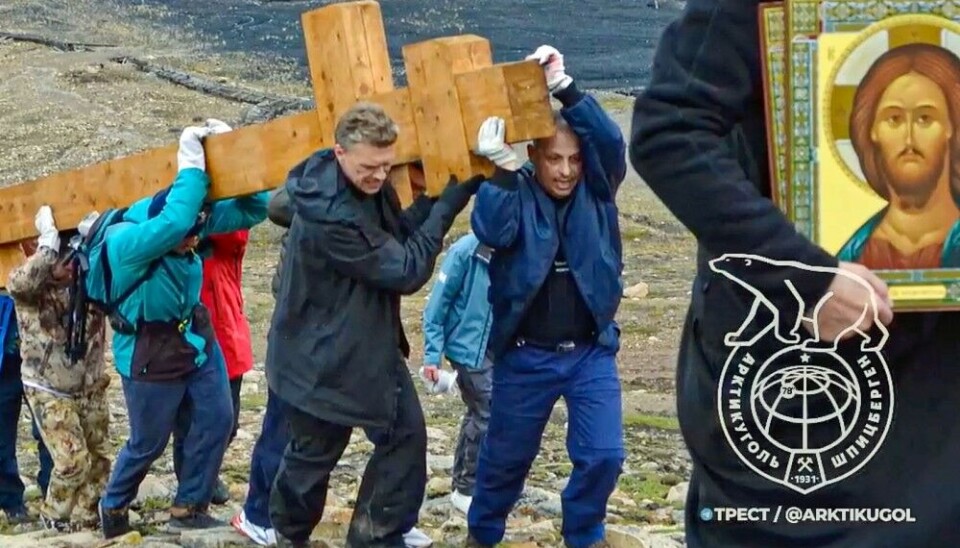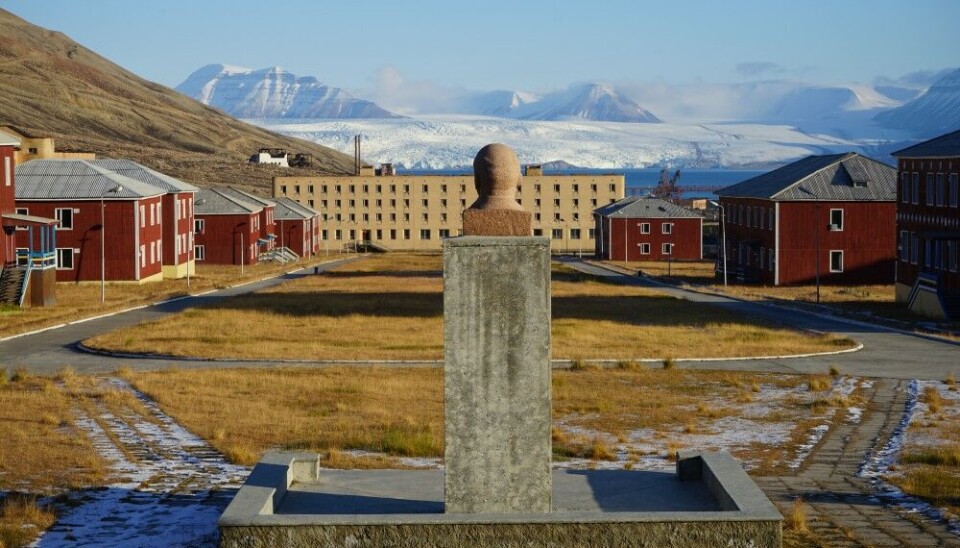
Svalbard Governor orders war-glorifying cross demolished. Russian official protests on behalf of the entire orthodox world
The seven-meter-high orthodox cross erected in August is of importance for the entire Christian world and a tribute to those Russians who discovered Svalbard, according to Ildar Neverov, director of Trust Arcticugol.
In a letter, dated September 18, the Governor of Svalbard gave a three-week deadline to demolish the cross, alternatively appeal the decision. The order is addressed to Trust Arcticugol, the mining company that is the Russian state’s extended arm at the Norwegian archipelago.
It was bishop Iyakov of Naryan-Mar and Mezen who led the ceremony to erect the giant orthodox cross in Pyramiden, a Soviet ghost town at Svalbard. The bishop is well-known for pushing Russia’s geopolitical ambitions in the Arctic by blessing polar outposts together with leaders of military and security structures.
Bishop Iyakov devoted his Svalbard cross to Georgy the Victorious, the saint seen in Russia as the protector of soldiers.
To underline the military message, a propagandistic St. George’s Ribbon decorated the cross. This ribbon is today a strong symbol of supporters of the Russian war against Ukraine.
Unlawful
Svalbard’s environmental protection and cultural act is strict and the Governor’s office underlines that erection of such a cross is not allowed without prior approval. “Trust Arcticugol is ordered to remove the cross that has been erected without permission in a cultural heritage, nature and outdoor area (KNF area) north of the harbor in Pyramiden,” the letter concludes.
In his appeal letter dated October 2, obtained by the Barents Observer, director Ildar Neverov draws historical lines back to the 16th century when the Pomors [Russian settlers living on the White Sea coasts] started to erect crosses along Arctic shipping lanes.
“Especially many crosses were on the shores of Spitsbergen [Russian name of Svalbard, not to be confused with the Island Spitsbergen] in the 18th and 19th centuries. We have information about 46 crosses from the time,” Ildar Neverov writes to fuel his argument that the new orthodox cross has a historic and cultural value.
He underlines that this memorial has an “increased importance since the Orthodox cross is a symbol of Christianity and the entire Orthodox world”.
“It is a tribute and an expression of honor to the discoverers of Spitsbergen and the polar explorers in the Arctic,” Neverov concludes and calls on the Governor of Svalbard to cancel the decision to demolish the cross, which is made of oak wood from Northwest-Russia.
The dispute has also made headlines in the local newspaper Svalbardposten.

“Legitimizes the war”
Kari Aga Myklebost, a professor in history at UiT The Arctic University of Norway, links the events to Moscow’s new narratives.
“The cross with the attached St. George’s ribbon must be seen in the context of the ongoing Russian warfare in Ukraine and the current Russian leadership’s instrumental use of historical monuments and narratives to legitimize the war and also to fortify Russian presence in regions of geopolitical and strategic value to the Kremlin,” Myklebost says to the Barents Observer.
She emphasizes that the Russian Orthodox Church is a key ally of the Kremlin in bolstering popular support for the war against Ukraine by blessing weapons and soldiers sent to the front.
Moscow dissatisfied
The disputed cross mirrors Russia’s growing dissatisfaction with Norway’s ruling of the Arctic archipelago.
At the 100-year anniversary of the Svalbard Treaty in 2020, Foreign Minister Sergei Lavrov sent a letter to Norwegian counterpart Ine Eriksen Søreide strongly signaling that Russia feels discriminated. Lavrov called for “bilateral consultations on the removal of limitations for Russian activity and structures on the archipelago.”
Eriksen Søreide replied and made clear “Svalbard is part of Norway [and] it is not natural that we consult with other countries about the execution of powers in our own areas.”
Propaganda parades
The Barents Observer has previously reported about Trust Arcticugol director Ildar Neverov staging a military-stylish Victory Parade in Barentsburg on May 9, followed by waving the separatist flag of the so-called Donetsk People’s Republic in Pyramiden on the same day.
On Navy Day, July 30, Russia’s Consul General in Barentsburg, GRU-affiliated Andrei Chemerilo, led a military-inspired small flotilla in the waters outside Barentsburg. This happened simultaneously as Vladimir Putin praised the ambitions of the Russian Navy at the main ceremony in St. Petersburg.
There is a pattern here, said Karen-Anna Eggen, a Ph.D. fellow at the Norwegian Institute for Defence Studies and an expert on Russian information confrontation in the Nordic region.
“All of these incidents should be seen together because that is how Russian influence attempts work. They do not have to be big events, but rather slowly normalizing Russian presence and rhetoric using whatever means available to, in this case, undermine Norwegian sovereignty on Svalbard.”















